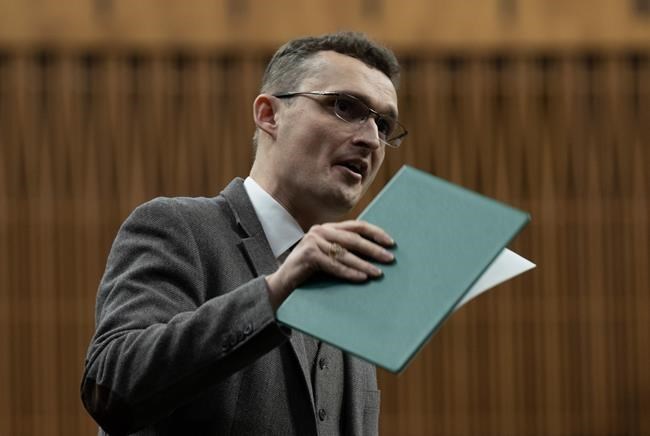OTTAWA — Conservative immigration policy should be focused on the ultimate goal of citizenship, the party's critic on the file said Thursday while moderating a panel in Ottawa.
Tom Kmiec criticized the sharp increase in temporary residents in Canada, as a large number of potential immigrants compete for few permanent resident opportunities.Â
"We don't want people just to come here, work here for a few years, and then leave," Kmiec said in an interview after the panel at the Canada Strong and Free Network conference.
"You can see the numbers are getting worse and worse and worse."
The panel members explored politically conservative solutions to Canada's ballooning population growth, which the Liberal government admits is becoming unsustainable.Â
Canada should focus on integrating people into Canada on permanent basis, Kmiec said.
That means moving beyond immigration targets and filling labour gaps to an approach that focuses on making newcomers part of "the Canadian family," he said.
Immigration Minister Marc Miller promised in March that Ottawa would put a "soft cap" on the number of temporary residents allowed to come to Canada. Those targets are expected to be set in September.Â
Miller also levelled out the number of new permanent residents expected to come to Canada in 2026, putting at least a temporary halt to year-after-year increases to immigration levels.Â
But the fix will require focusing on the experiences people have when they come to Canada, including reducing massive processing backlogs, Kmiec said.Â
"Immigration is not accounting," he said.
There has not been enough emphasis on citizenship in recent years in Canada, Aaron Wudrick, the director of the the Macdonald-Laurier Institute's domestic policy program, told the panel.Â
The system has largely become an economic exercise, he said.Â
The Liberals have come under increased scrutiny over the last year for some of the consequences of the rapidly increasing number of temporary residents, including the impact on the availability and affordability of housing.Â
Conservative Leader Pierre Poilievre has suggested the possibility of tying immigration levels to new housing starts in response.Â
That would likely mean lowering immigration levels, at least temporarily, Wudrick said, but doing so will have consequences.
"A lot of businesses in this country have a difficult time filling low-wage work, the solution has been to import cheap labour," he said.Â
When that low-cost labour is no longer available, prices are likely to go up, he said.Â
"There's not a magic bullet, where we're just going to cut the numbers and suddenly all these problems are going to go away."
Quebec Conservative Leader Eric Duhaime, who also appeared on the panel, advocated for giving provinces more control of the immigration in their jurisdictions.
Quebec already sets its own immigration targets, and Alberta Premier Danielle Smith has argued her province should have the same power.
The federal Conservative policy on that will likely be part of the party's next election platform, Kmiec said.
"That's something being actively debated, I think, within the (conservative) movement more broadly," he said.Â
This report by The Canadian Press was first published April 11, 2024.
Laura Osman, The Canadian Press



